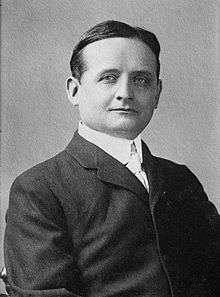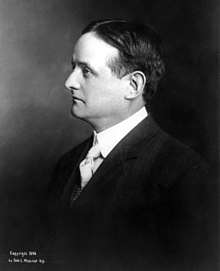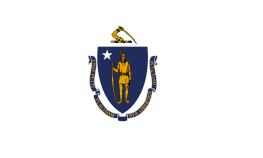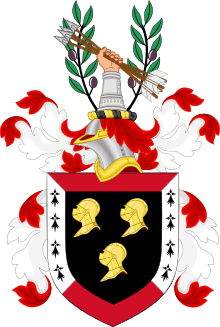John F. Fitzgerald
John Francis "Honey Fitz" Fitzgerald (February 11, 1863 – October 2, 1950) was an American politician, father of Rose Kennedy and maternal grandfather of President John F. Kennedy, Attorney General Robert F. Kennedy, and Senator Ted Kennedy.
John F. Fitzgerald | |
|---|---|
 | |
| Member of the U.S. House of Representatives from Massachusetts's 10th district | |
| In office March 4, 1919 – October 23, 1919 | |
| Preceded by | Peter Francis Tague |
| Succeeded by | Peter Francis Tague |
| 38th and 40th Mayor of Boston | |
| In office February 7, 1910[1] – February 2, 1914[2] | |
| Preceded by | George A. Hibbard |
| Succeeded by | James Michael Curley |
| In office January 1, 1906[3] – January 6, 1908[4] | |
| Preceded by | Daniel A. Whelton |
| Succeeded by | George A. Hibbard |
| Member of the U.S. House of Representatives from Massachusetts's 9th district | |
| In office March 4, 1895 – March 3, 1901 | |
| Preceded by | Joseph H. O'Neil |
| Succeeded by | Joseph A. Conry |
| Member of the Massachusetts Senate from the 3rd Suffolk district | |
| In office 1892–1894 | |
| Boston Common Council Ward 6 | |
| In office 1891–1892 | |
| Personal details | |
| Born | John Francis Fitzgerald February 11, 1863 Boston, Massachusetts, U.S. |
| Died | October 2, 1950 (aged 87) Boston, Massachusetts, U.S. |
| Resting place | St. Joseph Cemetery West Roxbury, Massachusetts |
| Political party | Democratic |
| Spouse(s) | Mary Josephine Hannon ( m. 1889–1950) |
| Relations |
|
| Children |
|
| Parents |
|
| Alma mater | |
Fitzgerald was a Democratic U.S. congressman who won two terms as mayor of Boston and made several unsuccessful runs for statewide office. He made major improvements to the port, and became a patron of the baseball team now known as the Boston Red Sox. He maintained a high profile in the city, with his theatrical style of campaigning and his personal charm and charisma that earned him the nickname "Honey Fitz."
His daughter Rose married Joseph P. Kennedy Sr., a son of his political rival P. J. Kennedy. In old age, Fitzgerald helped his grandson John F. Kennedy win his first election to Congress.
Early life and family
John Francis Fitzgerald was born in the North End of Boston, to Irish businessman/politician Thomas Fitzgerald of Bruff, County Limerick, and Rosanna Cox of County Cavan. He was the fourth of twelve children. Both of his sisters, Ellen and Mary, and his eldest brother, Michael, died in infancy. Fitzgerald's brother Joseph had severe brain damage from malaria and barely functioned. Only three of the children survived in good health. Fitzgerald's mother died when he was sixteen. His father wished for him to become a doctor to help prevent future tragedies of the sort that had marred the family.
Accordingly, after being educated at Boston Latin School and Boston College,[5][6] he enrolled at Harvard Medical School for one year, but withdrew following the death of his father in 1885.[7] Fitzgerald later became a clerk at the Customs House in Boston and was active in the local Democratic Party.
Fitzgerald was a member of the Royal Rooters, an early supporters' club for Boston's baseball teams, particularly its American League team, the modern Boston Red Sox. At one point, he was the group's chairman, and threw out the ceremonial opening pitch in Fenway Park's inaugural game (April 20, 1912), as well as in the 1912 World Series later that year. His great-granddaughter Caroline Kennedy threw out the first pitch for Fenway Park's 100th anniversary on April 20, 2012.[8]
Political career
Fitzgerald was elected to Boston's Common Council in 1891. In 1892, he became a member of the Massachusetts Senate, and in 1894, he was elected to Congress for the 9th district, serving from 1895 to 1901.[9] These early victories came about with support from the powerful boss of Boston's 8th ward, Martin Lomasney.[10] In December 1905, Fitzgerald was elected Mayor of Boston, becoming the first American-born Irish-Catholic to be elected to that office. In the process, he made an enemy of the powerful Lomasney, who had fielded one of his lieutenants, Edward J. Donovan, for the office.[11] Fitzgerald served as mayor of Boston from 1906 to 1908, was defeated for re-election in December 1907, but won the January 1910 election and returned to the office from 1910 to 1914.

Of his stylish manner, Robert Dallek wrote: "He was a natural politician—a charming, impish, affable lover of people..... His warmth of character earned him yet another nickname, "Honey Fitz," and he gained a reputation as the only politician who could sing "Sweet Adeline" sober and get away with it. A pixie-like character with florid face, bright eyes, and sandy hair, he was a showman who could have had a career in vaudeville. But politics, with all the brokering that went into arranging alliances and the hoopla that went into campaigning, was his calling. A verse of the day ran: 'Honey Fitz can talk you blind / on any subject you can find / Fish and fishing, motor boats / Railroads, streetcars, getting votes.' His gift of gab became known as Fitzblarney, and his followers as "dearos," a shortened version of his description of his district as 'the dear old North End.'"[12]
Fitzgerald's first term as mayor was little more than a poorly managed jobs-for-votes program, in which the city payroll expanded, and job-seekers were frequently granted provisional positions that did not require passing civil service exams. He lost the 1907 election in part because his opponent, Republican George A. Hibbard, promised he would be "cleaning up the mess" of his opponent.[13] The Republican-controlled city and state then attempted to reduce the influence of Democratic Irish ward bosses in Boston politics by altering the city charter. They eliminated the large common council, replaced the board of aldermen with a nine-seat city council, and extended the mayor's term to four years.[14] His January 1910 reelection bid was almost scuttled by a bribery scandal involving no-bid contracts with kickbacks during his first term. Fitzgerald managed to escape prosecution, but made a long-term enemy in Daniel H. Coakley, an Irish lawyer who had defended one of the key figures in the business.[15] In addition to contending with Lomasney's renewed opposition, he also had to contend with the rising star of James Michael Curley, who was kept out of the race by offering him Fitzgerald's old Congressional seat.[16] Fitzgerald won a narrow victory in the election, against James J. Storrow, a stiff Protestant Boston Brahmin.[17]
Early in his first term as Boston's mayor, Fitzgerald formulated a plan to revitalize the commercial importance of the city under the banner of "A bigger, busier and better Boston". This plan died with his first term, but gained traction after his reelection. Fitzgerald was able to persuade businesses and the Massachusetts legislature to invest $9 million for improvements to the port by 1912. Within a year, the investments began to pay off in the form of new port traffic to and from Europe.[18]
He was for years the most prominent political figure in the city of Boston, where P. J. Kennedy was a more behind-the-scenes Democratic Party figure. P. J. opposed Honey Fitz when the latter first ran for mayor, but they later became allies. In 1914, these two powerful political families (Kennedy and Fitzgerald) were united when P. J.'s son Joseph P. Kennedy Sr. married Fitzgerald's eldest daughter Rose.
Fitzgerald had, in the runup to the January 1910 election, promised Curley that he would not run for another term as mayor, since it was a position Curley sought. But in 1913, Fitzgerald decided to run for re-election, setting up a generational battle with Curley. Curley made common cause with Daniel Coakley, and they secured Fitzgerald's withdrawal from the race after threatening to expose a dalliance he had with a cigarette girl—Elizabeth "Toodles" Ryan, who was the same age as his daughter Rose—at a local gambling club.[19] Curley was subsequently elected in January 1914 to his first of four terms as Boston mayor.
From March 4, 1919, to October 23, 1919, Fitzgerald again served in Congress, now for the 10th district, until Peter F. Tague successfully contested the election. Fitzgerald was an unsuccessful candidate for the offices of Senator in 1916 and Governor in 1922. His opponent for the Senate was Henry Cabot Lodge. In 1942, he ran a quixotic campaign for the U.S. Senate, and lost the Democratic primary to Congressman Joseph E. Casey.
In his later years, Fitzgerald focused on his business interests and on honing the political instincts of his daughter Rose's promising sons. In 1946, when John Fitzgerald "Jack" Kennedy decided to run for Congress, 83-year-old Honey Fitz helped him plan his campaign strategy. At the victory celebration, Fitzgerald danced an Irish jig, sang "Sweet Adeline," and predicted that his grandson would someday occupy the White House. Shortly after his election to the presidency, President Kennedy renamed the presidential yacht the Honey Fitz in honor of his maternal grandfather.
Personal life
On September 18, 1889, Fitzgerald married his second cousin Mary Josephine "Josie" Hannon (1865-1964). She was a daughter of Michael Hannon and Mary Ann Fitzgerald.[20]
Children
| Name | Birth | Death | Age | Notes |
|---|---|---|---|---|
| Rose Elizabeth Fitzgerald | July 22, 1890 | January 22, 1995 | 104 years | Married on October 7, 1914, to Joseph Patrick Kennedy Sr.; had nine children: Joseph Patrick Kennedy Jr., John Fitzgerald Kennedy, Rose Marie Kennedy, Kathleen Agnes Kennedy, Eunice Mary Kennedy, Patricia Helen Kennedy, Robert Francis Kennedy, Jean Ann Kennedy, and Edward Moore Kennedy. |
| Mary Agnes Fitzgerald | November 1, 1892 | September 17, 1936 | 43 years | Married on April 29, 1929, to Joseph F. Gargan Sr.; had three children: Joseph F. Gargan Jr. and two younger daughters, Mary Jo Gargan and Ann Gargan. |
| Thomas Acton Fitzgerald | April 19, 1895 | September 7, 1968 | 73 years | Married on September 7, 1921, to Marion D. Reardon (died February 7, 1925); had one daughter: Marion Eunice Fitzgerald. Married again on October 11, 1930, to Margaret Bernice Fitzpatrick; had two children: Barbara Ann Fitzgerald and Thomas Acton Fitzgerald Jr. |
| John Francis Fitzgerald Jr. | December 7, 1897 | March 28, 1979 | 81 years | Married on April 28, 1928, to Catherine O'Hearn; had three sons: John Francis Fitzgerald III, Robert P. Fitzgerald, and Fred Fitzgerald. |
| Eunice Fitzgerald | January 26, 1900 | September 25, 1923 | 23 years | Never married.[21] |
| Frederick Hannon Fitzgerald | December 3, 1904 | February 8, 1935 | 30 years | Married on October 26, 1929, to Rosalind Miller; had one son: Frederick Hannon Fitzgerald, Jr. |
Death
On October 2, 1950, Fitzgerald died in Boston at the age of eighty-seven. His funeral was one of the largest in the city's history. President Harry S. Truman sent his sympathies and Fitzgerald's pallbearers included U.S. Senator Henry Cabot Lodge II, U.S. Senator Leverett Saltonstall (the grandson of the man who had given "Honey Fitz" his first job), future U.S. Speaker of the House John McCormack, Massachusetts Speaker of the House Tip O'Neill, and James Michael Curley. As "Honey Fitz" was carried to his final rest from Holy Cross Cathedral to St. Joseph Cemetery in West Roxbury, Massachusetts, a crowd of thousands who had gathered along the streets sang "Sweet Adeline".
Legacy
The official name for the Central Artery highway in Boston was "The John F. Fitzgerald Expressway," until it was torn down in the 1990s as part of Boston's "Big Dig" project which eliminated the Central Artery and replaced it with a tunnel. The resulting greenway above the tunnel where the expressway had been was named for Fitzgerald's daughter as the "Rose Fitzgerald Kennedy Greenway".
See also
- Kennedy family tree
- Timeline of Boston, 1890s-1910s
- 114th Massachusetts General Court (1893)
References
- "New Mayor of Boston". Arkansas Democrat. Little Rock, Arkansas. February 7, 1910. Retrieved March 16, 2018 – via newspapers.com.
- "Curley Serves Two Masters". The Barre Daily Times. Barre, Vermont. February 2, 1914. Retrieved March 15, 2018 – via newspapers.com.
- "Fitzgerald Boston's Mayor". The Washington Post. January 2, 1906. p. 1. Retrieved March 18, 2018 – via newspapers.com.
- "NEW HAND AT HELM". The Boston Globe. January 7, 1908. p. 1. Retrieved March 17, 2018 – via pqarchiver.com.
- "An Unfinished Life: John F. Kennedy Excerpt".
- {{cite web|url=https://www.holycross.edu/sites/default/files/files/libraryarchives/fitzgerald_john_f._collection_web.pdf
- McGoldrick, Monica. You Can Go Home Again: Reconnecting with Your Family, p. 155. W. W. Norton & Company, 1995, ISBN 0-393-31650-5.
- Boston Herald
- "Massachusetts", Official Congressional Directory, 1896
- O'Neill, pp. 33-34
- O'Neill, p. 36
- "Chapter Excerpt: An Unfinished Life by Robert Dallek". 14 November 2006. Archived from the original on 14 November 2006.
- O'Neill, pp. 37-38
- O'Neill, p 39
- O'Neill, pp. 39-40
- O'Neill, pp. 40-41
- O'Neill, pp. 41-42
- Fitzgerald, John F. (1914). Letters and speeches of the Honorable John F. Fitzgerald: mayor of Boston. City of Boston. p. 1. Retrieved 23 November 2011.
- O'Neill, pp. 43-44
- Goodwin, Doris Kearns (2001). The Fitzgeralds and the Kennedys: An American Saga. Simon and Schuster. pp. 88–89..
- "Ex-Mayor Fitzgerald's Daughter Dies at Boston". Fitchburg Sentinel. September 25, 1923. p. 12. Retrieved August 22, 2014 – via Newspapers.com.

Sources
- O'Neill, Gerard (2012). Rogues and Redeemers. New York: Crown Publisher. ISBN 9780307405364.
External links
| Wikimedia Commons has media related to John F. Fitzgerald. |
- United States Congress. "John F. Fitzgerald (id: F000164)". Biographical Directory of the United States Congress.
- Fitzgerald election records at ourcampaigns.com
- John F. Fitzgerald at Find a Grave
| Party political offices | ||
|---|---|---|
| First | Democratic nominee for U.S. Senator from Massachusetts (Class 1) 1916 |
Succeeded by William A. Gaston |
| Preceded by John Jackson Walsh |
Democratic nominee for Governor of Massachusetts 1922 |
Succeeded by James Michael Curley |
| Political offices | ||
| Preceded by Joseph H. O'Neil |
Member of the U.S. House of Representatives from Massachusetts's 9th congressional district March 4, 1895 – March 4, 1901 |
Succeeded by Joseph A. Conry |
| Preceded by Daniel A. Whelton |
Mayor of Boston, Massachusetts 1906–1908 |
Succeeded by George A. Hibbard |
| Preceded by George A. Hibbard |
Mayor of Boston, Massachusetts 1910–1914 |
Succeeded by James Michael Curley |
| Preceded by Peter F. Tague |
Member of the U.S. House of Representatives from Massachusetts's 10th congressional district March 4, 1919 – October 23, 1919 |
Succeeded by Peter F. Tague |


